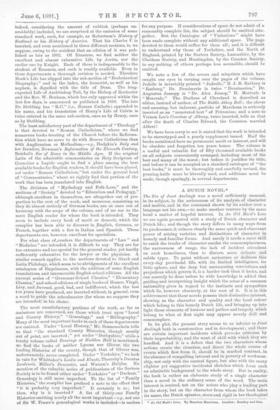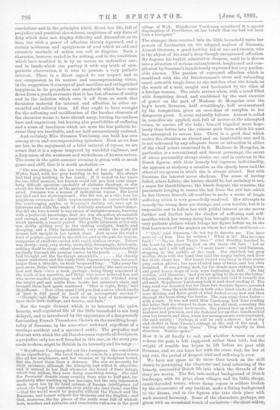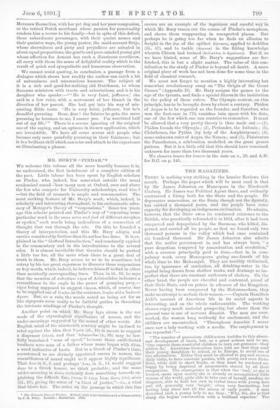A DUTCH NOVEL.*
The Sin of least Avelingh was a novel sufficiently unusual, in its subject, in the seriousness of its analysis of character and motive, and in the command shown by its author over a language not his own,—to make another venture by the same hand a matter of hopeful interest. In An Old Maid's Love we are again presented with a study of Dutch character and Dutch life ; and though the story differs in many ways from its predecessor, it evinces clearly the same quick and observant power of seizing varieties and distinctions of character in homely and familiar forms. And surely it needs a rarer skill to catch the truths of character amidst the commonplaceness, the narrowness of range, the lack of incident attendant on such homeliness, than to discern more delicate and subtle types. To paint without caricature or dullness this every-day provincial life, with its limited intelligence, its little sphere, and the deep but unreasoning convictions and prejudices which govern it, is a harder task than it looks, and can scarcely be done unless to wide knowledge is added that guiding and interpreting insight which the sense of a common nationality gives in regard to the instincts and sympathies which lie, however obscurely, at the root of it. It is in this achievement that these novels possess their distinctive interest, showing us the character and quality and the local colour which belong to this homely Dutch life, and bringing up into light those elements of humour and pathos and tragedy which belong to what at first eight may appear merely dull and commonplace.
In its plot, the present story seems to us inferior to Joost Avelingh both in construction and in development; and there are certain important incidents which provoke criticism by their improbability, and the want of skill with which they are handled. And it is a defect that the two characters whose actions create the situation, and direct the whole course of events which flow from it, should be in marked contrast, in the absence of compelling interest and in poverty of workman- ship, not only with the central figure, but also with the many slighter yet suggestive incidental sketches which form such an admirable background to the whole story. But in reality, the book is rather an elaborate study of a single character than a novel in the ordinary sense of the word. The main interest is centred, not on the actors who play a leading part in the story, but on the character from whom the book takes its name, the Dutch spinster, stern and rigid in her theological
* An ON Maid's Love. By Maarten Maarten& London: Bentley and Son.
convictions and in the principles which direct her life, full of prejudice and practical shrewdness, suspicious of any form of duty which does not display difficulty and. discomfort on its face, but with a power of affection sternly repressed, and a certain nobleness and uprightness of soul which no odd and eccentric methods of action can veil or disguise. Such a character, however varied in its setting, and in the conditions which have moulded it, is by no means an unfamiliar one ; and in hands which can portray it with any truth of sym- pathetic observation, it is sure to possess a very pathetic interest. There is a direct appeal to our respect and to our compassion in its austere and uncompromising virtue, in the suggestion it conveys of past sacrifices and extinguished happiness, in its prejudices and standards which have come down from a youth so remote that it has lost all sense of reality and in the isolation which cuts it off from so much that furnishes material for interest and affection in other un- eventful and solitary lives. All that ought to have wrought for the softening and modification of the harsher elements of the character seems to have shrunk away, leaving the outlines bare and ungracious, but leaving also possibilities of suffering and a sense of loneliness which are none the less pathetic be- cause they are inevitable, and are half-unconsciously endured.
And certainly Miss Suzanne Varelcamp can hold her own among stern and uncompromising spinsters. Even as we first see her, in the enjoyment of a brief interval of repose, we are aware that it is a repose tempered by watchful vigilance, and a deep sense of the weakness and wickedness of human nature. The scene in the quiet summer evening is given with so much grace and skill, that it is worth quotation :—
"She was sitting in the low verandah of her cottage on the Wyker Road, with her grey knitting in her hands. She always had that grey knitting in her hands. If it rested on her knees for one brief moment, her friends could tell you that some singu- larly difficult question—probably of abstruse theology, or else about the linen basket or the preserves—was troubling Suzanna's mind. Susanna was a woman of industrious repose. She loved her God and her store-cupboard. She did not, as a rule, love her neighbour overmuch—little unpleasantnesses in connection with the overhanging apples, or Susanna's darling cat, were apt to intervene and stifle the seeds of dutifully nurtured benevolence. Nor did she love herself to any excess of unrighteousness, knowing with a perfervid knowledge, that she was altogether abominable and corrupt, and even as a beast before Thee,' from bier mother's womb upwards, a remote period. The gentle laburnum at her side was slowly gilding over in the sinking sunlight, fragile and drooping, and a little lackadaisical, very unlike the natty old woman bolt upright in her basket chair. Just across the road a knot of poplars quivered to the still air, and in the pale far heaven, companies of swallows circled with rapid, aimless swoops. Nature was slowly—very, very slowly, tranquilly, dreamingly, deliciously, settling itself to sleep—silent already but for-a blackbird shrilling
excitedly through the jasmine bushes by the porch Betje had brought out the tea-things meanwhile the shining copper peat-stove and the costly little Japanese tea-cups, not much
larger than a thimble, on their lacquered tray. Take away the peat-stove, Betje,' said Susanna, the peat smells.' She said so every now and then—once a week, perhaps—being firmly convinced of the truth of her assertion, and Betje, who never believed her, and who never smelled anything under carbolic acid, whisked away the bright pail and kettle from beside her mistress's chair, and brought them back again unaltered. 'That is right, Betje,' said Mojuffrouw. How often must I tell you that a stove which smells a peat is full proof in itself of an incompetent servant P' —"Humph,' said Betje. For even the very best of housekeepers have their little failings, and fancies, and fads."
But the tragic element which is to interrupt the quiet, homely, well-regulated life of the little household is not long delayed, and is introduced by the appearance of a dangerously fascinating French Vicomtesse, thrown on the unwilling hospi- tality of Suzanne, by the somewhat awkward. expedient of a arriage accident and a sprained ankle. The prejudice and distrust with which the old Dutchwoman regards all foreigners, a prejudice only too well founded in this case, as the story pro- ceeds to show, might be British in its intensity and its range :—
" Mejultrouw Varelcamp did not like foreigners. She considered them superfluities. She loved them, of course, in a general sense, like all her neighbours, and her enemies, as by Scripture bound, but she loved them from a distance. She saw no necessity for their existence, although the Almighty had willed it otherwise, and it seemed to her that whenever she heard of their doings, which was seldom, they were doing something wrong. She read the Provincial Gazelle every evening from nine to half-past, im- mediately after washing up her tea-cups, but the only impression made upon her by its brief column of foreign intelligence (of which she forgot the contents even while she read them) was this —that the world would be peaceful without the French and the Russians, and honest without the Germans and the English 1 and that, moreover, the far places of the earth were full of wicked- ness, murders and robberies and treacheries unknown in the good
village of Wyk. Mejuffrouw Varelcamp considered it a special dispensation of Providence on her behalf that she had not been born a foreigner."
The stranger thus received into the little household turns her powers of fascination on the adopted nephew of Suzanne,
Arnout Oestrum, a good-looking lad of one-and-twen.ty, who is the object of his aunt's deep though unexpressed affection.
By degrees his boyish admiration deepens, until he is drawn into a situation of serious entanglement, heightened and com- plicated by Suzanna's injudiciously expressed but very pardon-
able alarms. The passion of repressed affection which is combined with the old Dutchwoman's stern and unbending creed, acts with tragic force as she watches what she dreads as the wreck of a soul, caught and fascinated by the wiles of a foreign woman. The crisis arrives when, with a mind filled with despairing dread, and maddened by the cool exercise of power on the part of Madame de Mongelas over the
boy's heart, Suzanna, half stumblingly, half overmastered by the temptation, gives an over-dose of morphia to her dangerous guest. A scene naturally follows. Arnout is called in, remedies are applied, and, full of horror at the attempted crime, he carries off the lady ; himself impelled more hope- lessly than before into the ruinous path from which his aunt has attempted to rescue him. There is a good deal which makes the situation an absurd and an improbable one, and it is not redeemed by any adequate force or attraction in either of the chief actors concerned in it. Madame de Mongelas, in particular, is a conventional and unreal personage, the secret of whose personality always eludes us ; and. in contrast to the Dutch figures, with their homely but vigorous individuality, she appears as shadowy a creation as the cloudy laces and the ethereal tea-gowns in which she is always attired. But with
Suzanne, the interest never slackens. The sense of having failed, where failure, she knows, should be, but certainly is not, a cause for thankfulness ; the blank despair, the remorse, the passionate longing to rescue the lad from the evil into which he has thrown himself, all combine to make a scene of tragic suffering whieh is very powerfully rendered. Her attempts to remedy the wrong done are strange, and even terrible, but it is impossible not to follow her with pitiful interest as she moves further and further into the shadow of suffering and self-
sacrifice which her wrong-doing has brought upon her. It is a very pathetic picture which brings her figure before us, as Effie first hears news of the nephew on whom her whole soul is set :—
'Girl,' said Susanna, do not try to deceive me. You have news of—of him. Has he written ? What is it P Has he come back ? '= No, no, dear Tante Sum cried Dorothy, touched to the heart by the yearning look on the sharp old face. ' Let us walk on, and I will tell you.'—' I must know—now,' said Susanna, stopping in the middle of the road. She clutched her grey woollen dress with the hand that held the empty basket, and drew her skirts about her. Her hands looked very bony in their coarse grey cotton gloves ; her oyes blinked once or twice, and her chin trembled. It was getting dark, for the clouds were sinking lower, and great heavy drops of rain were beginning to fall. He has written,' said Susanna; and you are going to show me the letter.' Silently Dorothy drew it out of her pocket and hold it towards the old maid. Mejuffrouw Varelcamp took it, and stood reading it. The long road was deserted but for these two desolate figures, arrested half-way. Over the wide fields on both sides black tracts of clouds were driving, and fierce gusts of wind dashed every now and then through the trees along the border. The rain came down faster— with a rush. It was not until Miss Varelcamp had done reading the letter that she stooped to draw up her old skirt, revealing the grey-knitted petticoat underneath. She pinned this up with great neatness and precision, and she fastened her spotless handkerchief over her bonnet, and then, when her arrangements were concluded, she said quietly Perhaps it will be only a shower, Let us try and shelter in Baas Vroom's cottage at the and of the road. I was coming away from there.' They walked rapidly in that direction. Neither spoke."
How it is all finally to end, and whether Arnout can ever redeem the past, is left suggested rather than told ; but the weight of trouble has begun to lift before we part with Suzanna, and we can leave her with the sense that, for her at any rate, the period of deepest trial and suffering is over.
We have not space to do more than touch on the skill
shown in portraying the character and local colouring of the homely, uneventful Dutch life into which the threads of the
story are woven. The flat, rain-soaked background of Dutch. landscape, with its prim, clean villages, and its little, sleepy, canal-threaded towns, whose damp repose is seldom broken by the occurrence of any incident, make a fitting background to the drama, and to the figures who take their place with such assured harmony. Some of the characters, perhaps, are given with an occasional touch of caricature —the stout widow,
Mevrouw Barsselius, with her pet dog and her poor companion, or the retired Dutch merchant whose passion for punctuality renders him a terror to his family—but in spite of this defect, these subordinate personages, with their quaint names and their quainter ways, the young pastor, the maid-servant Betje, whose shrewdness and piety and prejudices are mingled in about equal proportions, the gentle and pure-minded young girl whose affection for Arnout has such a disastrous overthrow, all carry with them the sense of delightful reality which is the result of quick and sympathetic and humorous observation.
We cannot resist quoting, in conclusion, a passage from a dialogue which shows how readily the author can catch a bit of naturalness and unconscious humour. The subject of it is a sick and good-for-nothing old Dutchman, to whom Suzanne ministers with tracts and exhortations, and it is his daughter who speaks He is very faint, juffrouw,' she said in a low voice, with a movement of her thumb in the direction of her parent. She had got into his way of mis- quoting Bible texts. He is very faint, juffrouw, but he's dreadful pursuing. Dear, dear ! the fainter he gets, the more pursuing he becomes to me, I assure you. I'm worritted half out of my " There is a serene ignoring of the original use of the saying, and an aptness in its new application, which are irresistible. We have all come across sick people who become only more painfully pursuing in their faintness ; but it is a brilliant skill which can seize and attach to the experience so illuminating a phrase.








































 Previous page
Previous page